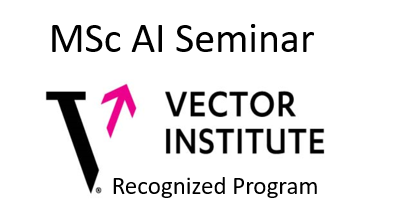Friday, February 17, 2023 - 11:00 to 12:00
SCHOOL OF COMPUTER SCIENCE – Colloquium Series
The School of Computer Science at the University of Windsor is pleased to present…
Colloquium Presentation by Dr. David Lindell

Date: Friday February 17, 2023
Time: 11:00am – 12:00pm
Location: Erie Hall, Room 3123
Reminders:
1. Two-part attendance mandatory (sign-in sheet, QR Code)
2. Arrive 5-10 minutes prior to event starting - LATECOMERS WILL NOT BE ADMITTED. Due to demand, if the room has reached capacity, even if you are "early" admission is not guaranteed.
3. Be respectful of the presenter by NOT knocking on the door for admittance once the door has been closed whether the presentation has begun or not (If the room is at capacity, overflow is not permitted (ie. sitting on floors) as this is a violation of the Fire Safety code).
4. Be respectful of the decision of the advisor/host of the event if you are not given admittance. Remember, The School of Computer Science has numerous events occurring in the near future.
Abstract:
In applications from robotics and computer vision to autonomous driving and remote sensing, there is an increasing need for optical sensors and visual computing algorithms that efficiently sense and understand the surrounding environment. Yet, conventional imaging systems fail to exploit or, worse, discard captured physical properties of light that are rich with information. For example, time of flight, polarization, wavelength, coherence, angular information, and other physical properties are encoded in photons as they interact with an environment. By understanding and carefully modeling the physics of light transport, we can reveal scene information that would otherwise remain invisible, enabling powerful and efficient methods for vision and sensing. In this talk, I describe physics-based techniques for applications in 3D imaging and computer vision. I discuss efficient methods for imaging around corners and through scattering media and make a connection to methods for neural rendering and novel view synthesis through different approximations of the radiative transfer equation.
Keywords: computational imaging; non-line-of-sight imaging; neural fields
Biography:
David Lindell is an Assistant Professor in the Department of Computer Science at the University of Toronto. His research combines optics, emerging sensor platforms, machine learning, and physics-based algorithms to enable new capabilities in visual computing. Prof. Lindell’s research has a wide array of applications including autonomous navigation, virtual and augmented reality, and remote sensing. Prior to joining the University of Toronto, he received his Ph.D. from Stanford University. He is the recipient of the 2021 ACM SIGGRAPH Outstanding Dissertation Honorable Mention Award.

SCHOOL OF COMPUTER SCIENCE COLLOQUIUM PRESENTATION
5113 Lambton Tower 401 Sunset Ave. Windsor ON, N9B 3P4 (519) 253-3000 Ext. 3716 csgradinfo@uwindsor.ca
